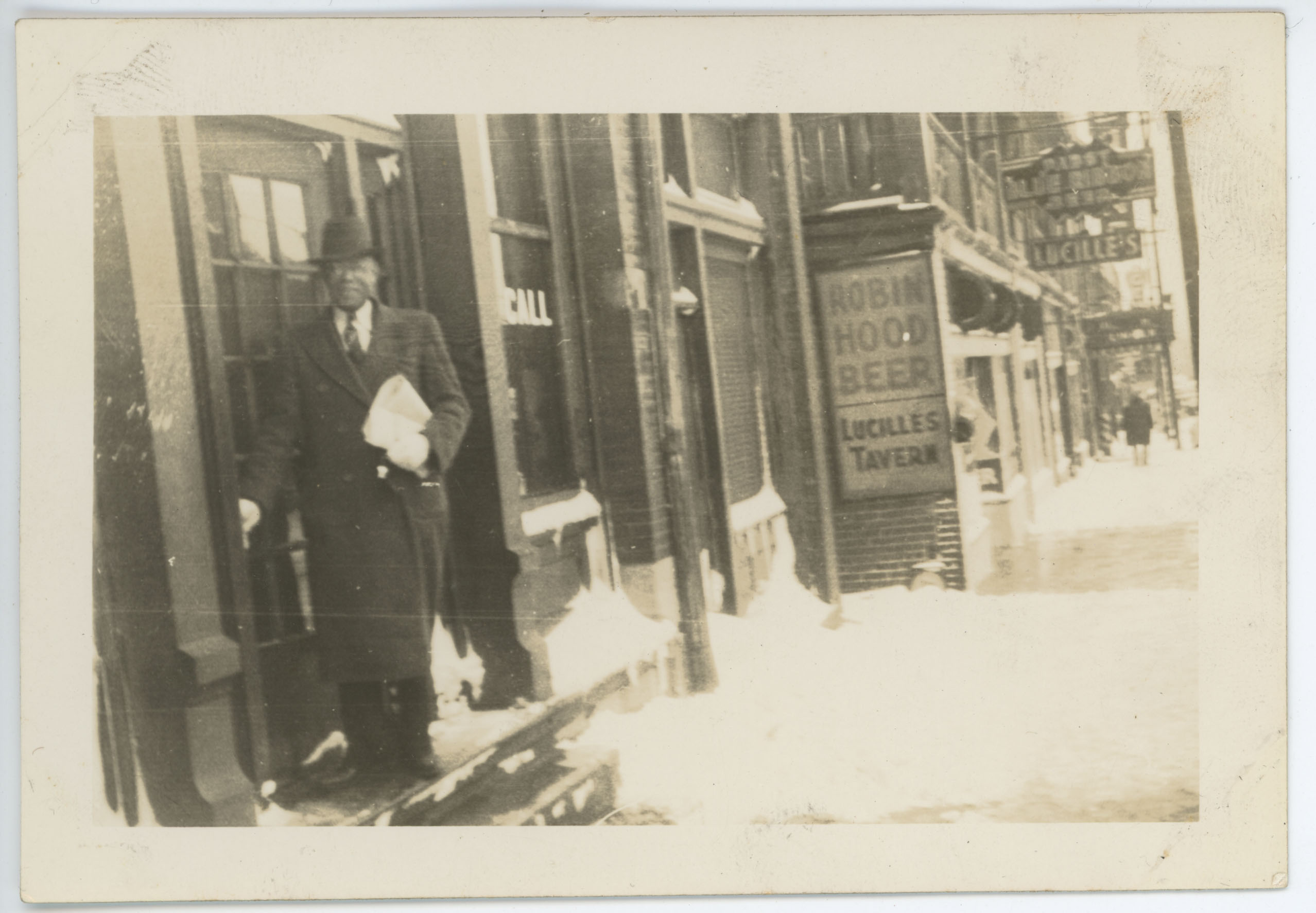Heeding the Call
The first edition of the Kansas City Call was published on May 6, 1919. It was one of 22 newspapers published by Kansas City’s African American community near the beginning of the 20th century, but the only one that survived past 1943. From an inauspicious four page paper, the paper soon grew to one of the most successful black newspapers in the nation.
The Call’s founder, Chester Arthur Franklin, was born in 1880 in Denison, Texas. He moved with his family to Omaha, Nebraska in 1887, where his father founded the Omaha Enterprise newspaper to advocate for blacks in Omaha. Just two years later, his father’s health declined and the family moved to Colorado on the advice of doctors who thought the climate might improve his condition. There the Franklins purchased another black newspaper, the Star. By the time Chester’s father died in 1901, Chester and his mother, Clara Franklin, were already successfully running that newspaper themselves.
By 1913 Chester Franklin had considerable experience in the newspaper business, but he wanted to reach a broader audience. He moved to Kansas City, which had a larger African American population, and entered into the printing business until he could gain the resources and local reputation required to open another newspaper. On May 6, 1919, he finally founded the Kansas City Call newspaper, which he would own and edit until his death in 1955.
The new business resided at 1311 East 18th Street in a small 800 square foot building. Under Franklin’s leadership, the Call served as more than a news source for the black community. It advocated for equality and served as the most tangible public voice of the black community. In 1922, the Call’s success already necessitated a new, larger building that was located at 1715 East 18th Street.

The newspaper especially thrived after it hired Editor Roy Wilkins in 1923. Wilkins, who went on to be the executive secretary of the National Association for the Advancement of Colored People (NAACP) in 1955, provided thought-provoking articles for the Call in his regular column, “Talking It Over.” The paper even came to rival one of the nation’s most eminent black newspapers, the Chicago Defender.
In the 1920s and 1930s the Call helped the African American community win several local battles for civil rights. Blacks gained the right to serve on juries in Kansas City. Segregation laws in employment and housing were reduced, although not defeated outright. In one case, Wilkins and the Call led boycotts against a bakery that resulted in the hiring of black truck drivers. A more controversial, but persistent, message in the Call advocated a reduction of violence within the black community itself. A political conservative at heart, Franklin believed strongly that the black community needed to help themselves as much as they required equal rights.
When Chester Franklin died in 1955, his wife, Ada Franklin, and another editor, Lucile Bluford, a graduate of the University of Kansas with a degree in journalism, took over the paper and continued its legacy. (The Lucile H. Bluford Branch of the Kansas City Public Library is named in her honor.) The newspaper remained among the six most widely-circulated black newspapers in the nation. Today the Kansas City Call still advocates in the interests of the African American community from the 18th Street location that Chester Franklin purchased in 1922.
Read full biographical sketches of people involved with the Kansas City Call, prepared for the Missouri Valley Special Collections, The Kansas City Public Library:
- Biography of Chester Arthur Franklin (1880-1955), founder of the Call newspaper, provided by the Black Archives of Mid-America.
- Biography of Lucile H. Bluford (1911-2003), journalist and former owner/publisher of the Call newspaper, by Mary I. Beveridge; Bluford worked at The Call for 69 years as a reporter, editor, and eventually owner of the paper.
- Biography of Ada Crogman Franklin (1886-1983), teacher, actress, and producer, provided by the Black Archives of Mid-America; Franklin was the wife of Chester Franklin and a noted civil rights activist in her own right.
- Biography of Roy Wilkins (1901-1981), journalist and civil rights leader, by David Conrads; Wilkins worked at the Call for eight years and eventually became the leader of the National Association for the Advancement of Colored People (NAACP).
- Biography of Jeremiah Cameron (1919-2008), educator and social critic, by Mary I. Beveridge; Cameron was a former writer for the Call.
- Biography of Herman A. Johnson (1916-2004) and Dorothy H. Johnson (1916-2004), philanthropists, by Mary I. Beveridge; Dorothy Johnson was a journalist for the Call.
- Biography of Felix Payne (1884-1962), businessman and politician, by David Conrads; Payne co-founded the Kansas City American, a rival newspaper to the Call.
Visit the Kansas City Call’s official website.
View images relating to Chester Franklin and the Kansas City Call from the Missouri Valley Special Collections:
- C. A. Franklin School; named after Chester Franklin, founder of the Call.
- Lucile H. Bluford Branch Library; named in honor of Lucile Bluford.
- Postcard of the YMCA Building on the Paseo between 18th and 19th Streets; Chester Franklin assisted in the fundraising for its construction.
- Wheatley Hospital, 1950; Chester Franklin was the first chairman of the board of Wheatley-Provident Hospital.
Check out the following books and articles about Chester Franklin and the Kansas City Call:
- "Chester A. Franklin and Harry S. Truman: An African-American Conservative and the ‘Conversion’ of the Future President," by Thomas D. Wilson, in the Missouri Historical Review.
- Take Up the Black Man’s Burden: Kansas City’s African American Communities, 1865-1939, by Charles E. Coulter; contains a section on African American newspapers in Kansas City history, pp. 99-117.
- Kansas City Women of Independent Minds, by Jane Fifield Flynn; contains sections about prominent female leaders who were involved with the Call, including Elizabeth Crogman, sister of Ada Franklin (38-39), Ada Franklin (pp. 61-62), and Lena Smith (pp. 149-150).
Continue researching Chester Franklin and the Kansas City Call using archival material held by the Missouri Valley Special Collections:
- Vertical File: Newspapers – Kansas City Call
- Vertical File: Franklin Ada C. and Chester A.
- Vertical File: Bluford, Lucile publisher and editor for the Call
- Ramos-Lincoln Collection – Vertical Files: Newspapers – Kansas City
- Vertical File: Buildings – Kansas City Call; focusing on the building that housed the Call
- Manuscript File: Donnelly, M. Kathleen; a 29 page manuscript about the Kansas City Call
- Vertical File: Black Archives of Mid-America; focusing on the History of the Kansas City Call
- Vertical File: Gaines, Lloyd; contains a listing of references in the Call to the historic Lloyd Gaines desegregation court cases between 1936-1939
- Vertical File: Kansas City Sun newspaper; an early rival to the Call
To conduct further research using archival material, check out the "Franklin Collection" at the Black Archives of Mid-America in Kansas City.
References:
A. Theodore Brown and Lyle W. Dorsett, KC: A History of Kansas City, Missouri (Boulder, CO: Pruett Pub. Co., 1978), 201-202.
"Chester Arthur Franklin Biography," the Black Archives of Mid-America in Kansas City.
Charles E. Coulter, Take Up the Black Man’s Burden: Kansas City’s African American Communities, 1865-1939 (Columbia, MO: University of Missouri Press, 2006), 108.
Henry C. Haskell and Richard B. Fowler, City of the Future: A Narrative History of Kansas City, 1850-1950 (Kansas City, MO: F. Glenn, 1950), 36-40.
"The History of the Kansas City Call," the Black Archives of Mid-America in Kansas City.

